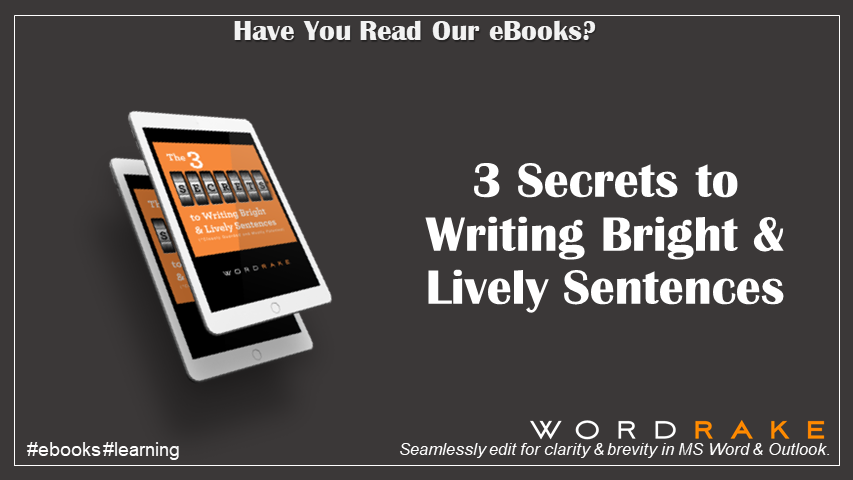Writers slow down their sentences with unnecessary words that delay the point. They may do this because middle school English teachers told them to use transitions; they read great 19th century writers renowned for languid and balanced sentences; or they’re trying to sound sophisticated by relying on industry clichés. Your readers won’t care why you write as you do—they will only care that they must read it. So do them a favor and cut the clutter.
Four types of sentence-starting clutter include:
- Uninformative artificial subjects – there are, it is, there were,
- Unhelpful throat-clearing phrases – it is important to consider that…
- Empty introductory phrases – the purpose of this article is to…
- Unnecessary transition words – clearly, presently, therefore, subsequently
Because these lead-ins are often used in speech, you won’t notice them in your own writing, even if you notice them in the writing of others. Let’s look at how to recognize these patterns and cut them from your writing.
Uninformative Artificial Subjects
Some words take up space at the start of a sentence without conveying any meaning. The most common offenders are there is, there are, there was, there were, it is, and it was. Writers use them because they believe it broadens the sentence, adds emphasis, or sounds sophisticated. Readers simply skip them.
Some instructors and editors call these phrases dummy subjects, artificial subjects, or existential openings. I think dummy subject is the most helpful term because it reminds me that these words function as a subject but don’t add any value. They can even hide a vivid subject that already exists in the sentence. Look for smart (real) subjects in your sentences.
There are Three principles that help solve this issue.
There is Some evidence from clinical studies suggests that this medication may be effective.
There are Many young women who work at factories.
There is no question that this This measure will improve environmental protections in the region.
While this is good advice, don’t arbitrarily delete every there is, there are, there was, there were, it is, and it was from your document, because you may need it. When there and it refer directly to something in the sentence, the words function as pronouns, so you should not cut them. For example:
There is no lack of motions that the Council approved but later tabled.
WordRake removes these dummy subjects so your main ideas can stand out. Try it. You may be surprised how often you don't need these words.
Unhelpful Throat-Clearing Phrases
Many unnecessary lead-ins start with It is… and have that shortly after. These phrases feel familiar, but that familiar feeling probably means it’s an industry cliché. The phrases add no information and are the equivalent clearing your throat into a microphone at a lectern: You already had the audience attention; clearing your throat before delivering your message is condescending overkill. Skip to the main idea. It usually comes after the word that.
It is important to consider that the The Plaintiff may have been lying.
It is axiomatic that That a resolution of legal issues or choice of law is required.
It is suggested that the The authorities should create new safety measures.
For this reason, we We demand a new trial.
Here, none of these introductory phrases added any useful information for the reader. You can recognize throat-clearing phrases by looking for posturing, emphasis, clichés, and truisms. Lawyers love to write it is axiomatic that thinking it sounds authoritative but readers understand it as I couldn’t find supporting authority for the proposition.
Once edited to delete the wordy phrases, the sentences become powerful. Stating facts directly adds punch and improves pace. These WordRake edits also reduce word count, remove convoluted Latin grammar, and avoid unnecessary dependent clauses. WordRake catches dozens of introductory expressions like these, no matter which verb tense or generic adjective writers use. When necessary, WordRake will edit the rest of the sentence to retain the meaning of the wordy introduction.
Empty Introductory Phrases
While some introductory phrases waste space, but can provide tone or emphasis, others serve no rhetorical or informational purpose. These phrases increase sentence length and can raise more questions than they answer, such as Was this fact in doubt? Was something else supposed to happen? Was this document written for a different purpose than presented? If you don’t want to raise doubt or annoy your reader, then leave it out.
The purpose of this paper is to examine This paper examines human resource management practices in innovation.
In this case, the The lack of evidence presented by the HOA requires that its motion be denied.
There can be no doubt that the The company lost profits because of the error.
In any event, Mr. Gonzalez frequented the building regularly.
What happens is that he He goes back to school.
Sometimes phrases that are empty when alone become meaningful when paired with another phrase for contrast. For example: In that case, as in this case, the plaintiff claimed to have suffered herniated disk because of allegedly defective seats.
Even sophisticated writers occasionally introduce or connect their ideas with unnecessary filler words and over-eager editors may cut more than necessary. WordRake deletes or shortens many types of superfluous introductory statements and lead-ins, while also recognizing when those same phrases may be useful. This balance is built into WordRake’s algorithms, but you always have the final choice about whether to accept or reject an edit.
Unnecessary Transition Words
Transitions between sentences and paragraphs can enhance clarity and cohesion, but you probably need fewer of them than you think. Clear ideas will flow without unnecessary transitions and forced transitions can sound stilted and robotic. Look for adverbs like clearly, or presently, which might weaken your point; time words that reiterate information derived from verb tense like subsequently; and clunky conclusion words like therefore. Then rewrite the sentence so the reader grasps your meaning without the neon sign. Though this advice may seem controversial, but if you rewrite your sentences without relying on artificial transitions, you’ll find they read more smoothly and are more persuasive.
Clearly, the The spotlight on conditions at the company has pressured executives to improve their practices.
Presently, many Many major online education programs offer their own certification.
Thereafter, the The fair moved to bigger cities to attract larger crowds.
Cut Clutter and Improve Pace with WordRake
Many great communicators write by the rhythm they hear, but what may seem moving in speech is cumbersome in writing. Others are unsure of writing rules and have absorbed bits and pieces of writing advice from everyone from mentors to middle school teachers. But you can write with confidence when you have a writing coach in your computer. WordRake knows the rules of business and legal writing, and it never tires or complains. Try WordRake today and see how it tightens your writing and improves your message.
About the Authors
Ivy B. Grey is the Chief Strategy & Growth Officer for WordRake. Before joining the team, she practiced bankruptcy law for ten years. In 2020, Ivy was recognized as an Influential Woman in Legal Tech by ILTA. She has also been recognized as a Fastcase 50 Honoree and included in the Women of Legal Tech list by the ABA Legal Technology Resource Center. Follow Ivy on Twitter @IvyBGrey or connect with her on LinkedIn.
Danielle Cosimo is a Language Usage Analyst for WordRake. Before joining the team, she was a translator and editor for non-native English speakers applying to degree programs in the United States and the UK. Danielle is formally trained in linguistics and has a certificate in computer programming. She is fluent in English, Portuguese, and Spanish. She applies her interdisciplinary knowledge to create WordRake’s editing algorithms.









